Table of Contents
The Many Negative Associations with Painkillers
Painkillers – hero, villain, friend and foe in one. What’s your opinion about them? Have you been told:
- Don’t take them, they’re bad for your liver and body.
- You’ll become reliant, dependent, or addicted to them. A good-for-nothing, pathetic junky.
- You’ll need more and more of them to kill the pain and eventually, nothing is going to save you.
Maybe you’re the one who tells yourself such things. These were beliefs that had been drilled into my head as a child and young adult; scary old wives’ tales of the horrors of addiction and untreatable pain. That was why I only took the mildest painkillers, whilst enduring my two worst life-and-death situations.
Pin to Your Chronic Pain & Painkillers Boards:

The Dangers of Leaving Chronic Pain Untreated
Bravo, what a brave, strong girl. So self-reliant, self-sufficient, so much willpower, and all that crappy jazz. This approach isn’t wrong per sé, especially if they were acute, one-off episodes. But when the pain is chronic, neverending and unyielding, it can become dangerous to not treat it.
Pain is a deep, dark pit that co-exists with the poisonous snakes of severe depression, anxiety, and yet more pain. There can always be more pain, and there can always be different kinds of pain.
Chronic illness patients learn to identify the unique characteristics of every pain symptom over time. Almost as if we were connoisseurs of pain.
Pin to Your Chronic Pain Boards:
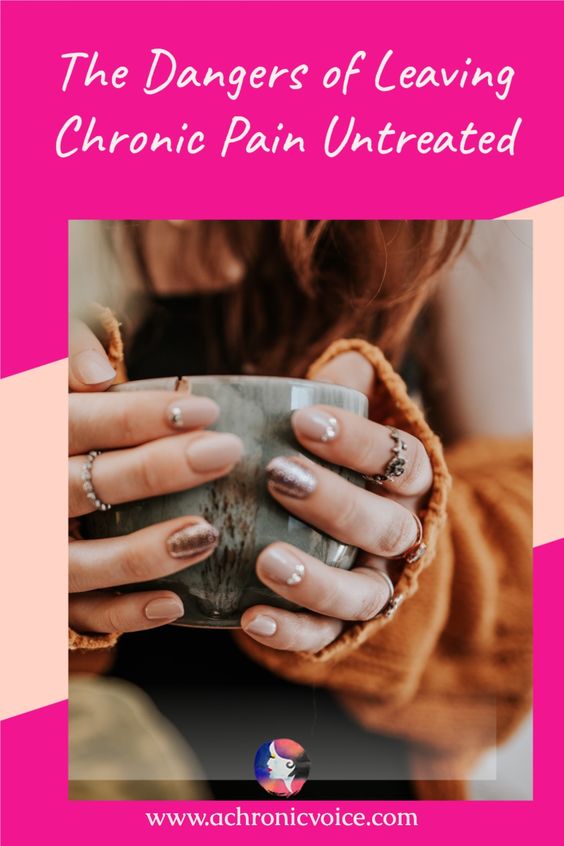
Sensitisation to Chronic Pain
Pounding muscle pain pairs well with Sjögren’s Syndrome, whilst those mini joint aches are distinctive of Lupus. This confusion in my brain is a hangover from epilepsy, whilst that severe headache is Lupus manifesting in the Central Nervous System.
The longer you need to deal with pain, the more your sensitivity to it increases. This is due to a number of factors: you’re sick of being in pain, previous bad experiences train your brain to be hypervigilant, and your body starts to become sensitised to the overexposure. This oversensitivity does nothing to help your body, your mind, or your situation. It only makes you more fearful, depressed, anxious, and leaves you feeling beaten and defeated.
Improving My Quality of Life by Including Painkillers
Over the years I have become more liberal when it comes to my relationship with painkillers. In fact, I carry a strip of tramadol in my wallet wherever I go.
And just like every other person with chronic illness, I have a pouch filled to the brim with all sorts of emergency medications and supplies in my bag: beta blockers, benzodiazepines, antihistamines, antibiotics, urinary alkalinisers, anti-inflammatory lozenges and plasters, peppermint oil, a plastic bag for throwing up, etc, etc and of course, painkillers.
My new pain management ‘strategy’ is to pop a painkiller after two hours or so, if my aches do not subside after my morning round of medications. This is especially helpful if I have an appointment or need to leave the house.
If I can nip pain in the bud, it saves me from a bigger pain flare, where I would need steroids instead to control it. That solution isn’t any better, as steroids come with its own set of nasty and sometimes permanent side effects.
Pin to Your Pain Management Boards:
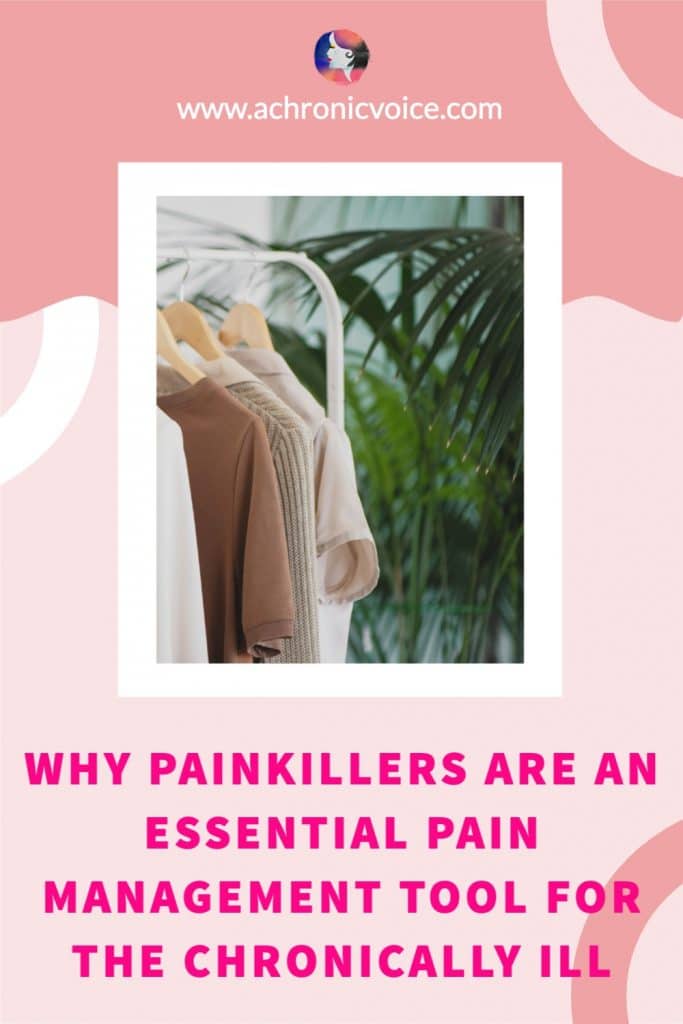
How This Pain Management Strategy Improves the Quality of My Life
This pain management strategy can make such a huge, positive difference to my entire day. It improves my quality of life, just like that.
After taking painkillers, I start to feel life returning to my body, and the cogs of my brain resuming their action. It becomes possible to get some work done, clean the house, do some exercise, or go out to socialise.
All these activities in turn, have huge benefits to my life and to my physical, emotional and mental health. I pay off some bills, boost my self-esteem, reclaim some independence, improve my living conditions, and spend quality time with loved ones. We all know how important these factors are as a human being, and to live a decent life.
All these great benefits, just because I decided to take my prescribed painkillers instead of wrestling with pain, and wasting my day away. It also isn’t just the current day that’s wasted, but the next few days needed to recover from the pain itself as well.
Pin to Your Chronic Pain & Painkillers Boards:
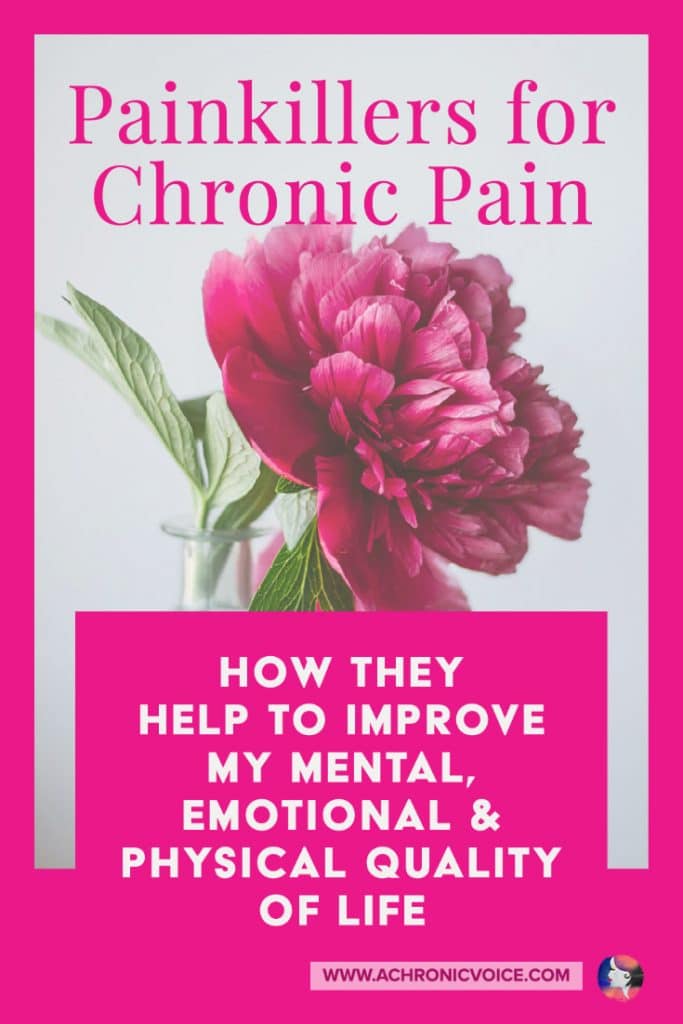
Painkillers & Medications Should Target the Underlying Cause
It’s important to know what specific medications or complementary treatments you will need to treat different types of pain. This may be confusing in the beginning, but you will learn to understand your body better and what it needs to heal over time.
What My Opioids Can & Can’t Do for Me
For example, taking tramadol might help with my period cramps, suppress an early onset of a Lupus or Sjögren’s pain flare, and ‘regular’ types of bodily injuries. But tramadol is not going to do anything for my Lupus CNS headaches, epileptic brain fog, or nerve pain in my feet.
You need to understand the root cause of the pain, and target it from there. Painkillers in themselves are not a one stop solution.
Dealing with Inflammatory Type Pains for Me
Because the source of Lupus CNS headaches are inflammatory in nature, NSAIDs (anti-inflammatories) are needed to suppress them. This means Ibuprofen or its equivalent.
This is tricky for me however, as I also have Antiphospholipid Syndrome (a blood clotting disorder), and all NSAIDs interact with my blood thinning medications. Hence, I need to be cautious with how much I take.
The alternative – which I’m currently using – is a temporary increase in my steroid dose. It’s ‘safer’ than taking an NSAID painkiller every day under these circumstances.
Painkillers are Useless for Treating My Epilepsy Brain Fogs
For these, I take a benzodiazepine such as clonazepam, to help me get a better night of rest. This in turn helps to give my brain a break, so that it has more resources for healing whilst I sleep. A lack of or poor quality sleep is after all, the biggest trigger for epilepsy.
Painkillers for Neuropathic Pain
Pregablin (Lyrica) is what I take or took for nerve tingles and pain. This medication is a different class of painkillers; it specifically targets neuropathic pain. It is also used to treat epilepsy. Taking pregabalin is not going to do much for my other sources of pain.
Pin to Your Painkillers & Chronic Illness Boards:
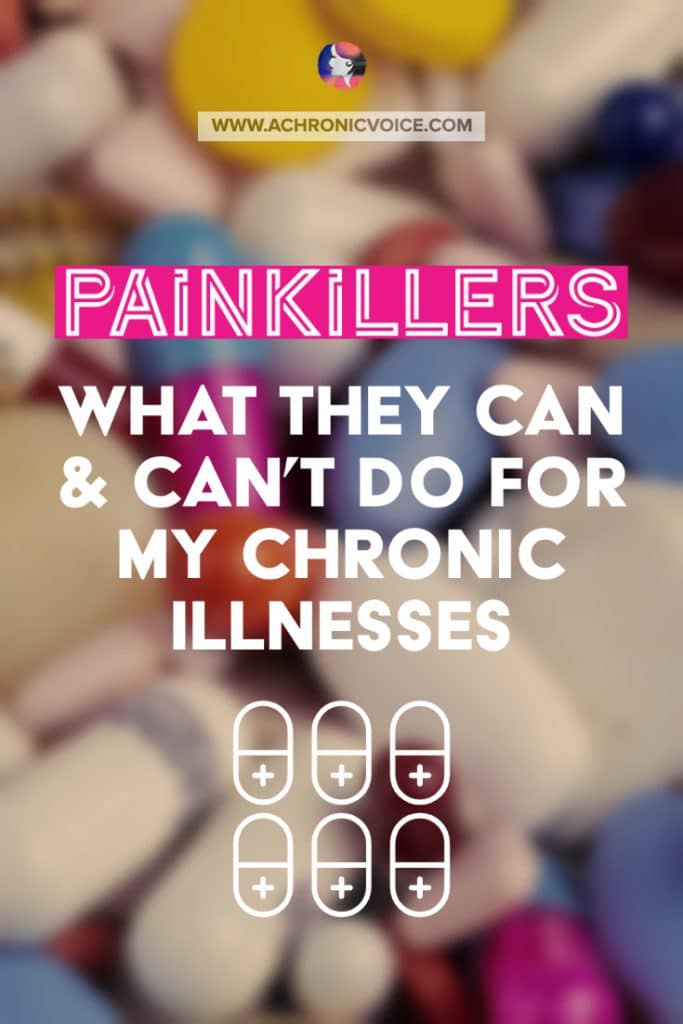
There is No Cut-and-Dry Solution to Managing Your Own Pain
As you can tell by now, I need to know what sort of pain I’m dealing with, before I know what works. It isn’t as straightforward as ‘pop a pain or chill pill’, but to ‘pop the right pill’.
There is no cut and dry or hard and fast rule as to how and what you should do or take. But do what’s best for you. Best being how it makes you feel from an over all perspective.
I have lifted all the internalised stigma and prejudice I used to hold on painkillers, and now view them as one of my biggest allies. Having said that, I am not claiming that this is the only way we should cope with all our pain.
Medications are toxic to a degree. But bearing with pain is also toxic in equal measure, as it impairs our quality of life, and shrivels us up into a shadow of who we once were. In other words, pain sucks the life out of us.
I definitely do not pop painkillers like candy all day long. They are my allies, not my masters. I am not their slave, but I am indeed grateful for the reinforcements and support they grant in times of need.
Pin to Your Chronic Illness & Painkillers Boards:
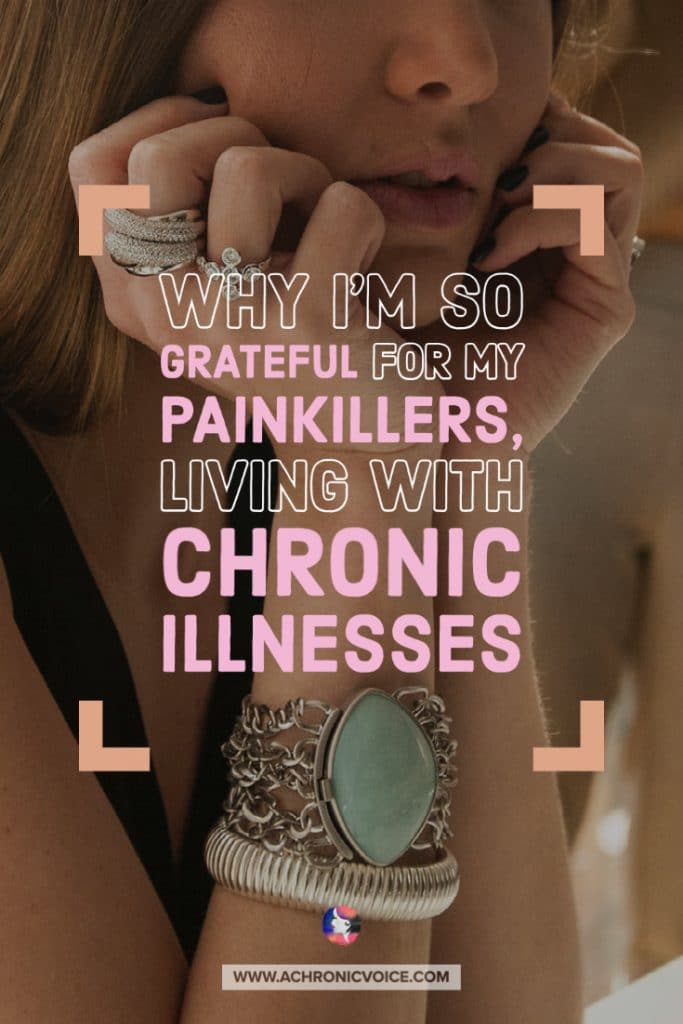
If Not for Painkillers…
If not for painkillers, I’d be spending more time in bed suffering for no good reason. I’d be unable to meet my friends and family, which helps with my emotional and mental wellbeing. It’s a proven fact that humans need community in order to survive and thrive.
If not for painkillers, I’d be unable to accomplish whatever amount of work it is that I can do. This not only helps me to feel like a useful member of society, but also helps to pay the bills, and stimulate my brain.
If not for painkillers, I’d be unable to cook a proper meal for myself, wash up, or clean the house. Food is also medicine, and to be able to nourish my body is a blessing.
To keep the house tidy and organised brings a sense of peace and joy, and is important for our mental wellbeing. It isn’t pleasant to feel like you’re a pig living in a sty, or relying on liquid nutrition and snack bars for all your meals.
If not for painkillers I wouldn’t be able to clean up after, care for and spend time with my birds and puppy. Quality time with pets have plenty of emotional benefits, which is another form of healing.
I’d also be unable to write or blog this much, activities that I view not only important for its advocacy aspects, but also as hobbies that I’m passionate about. Without painkillers, I wouldn’t be able to educate myself as much I want to, which are all food for the mind, body and soul.
How then, can you call painkillers evil in and of themselves? For those of us who live with chronic pain, they are one of our biggest allies.
Pin to Your Chronic Illness Life Boards:
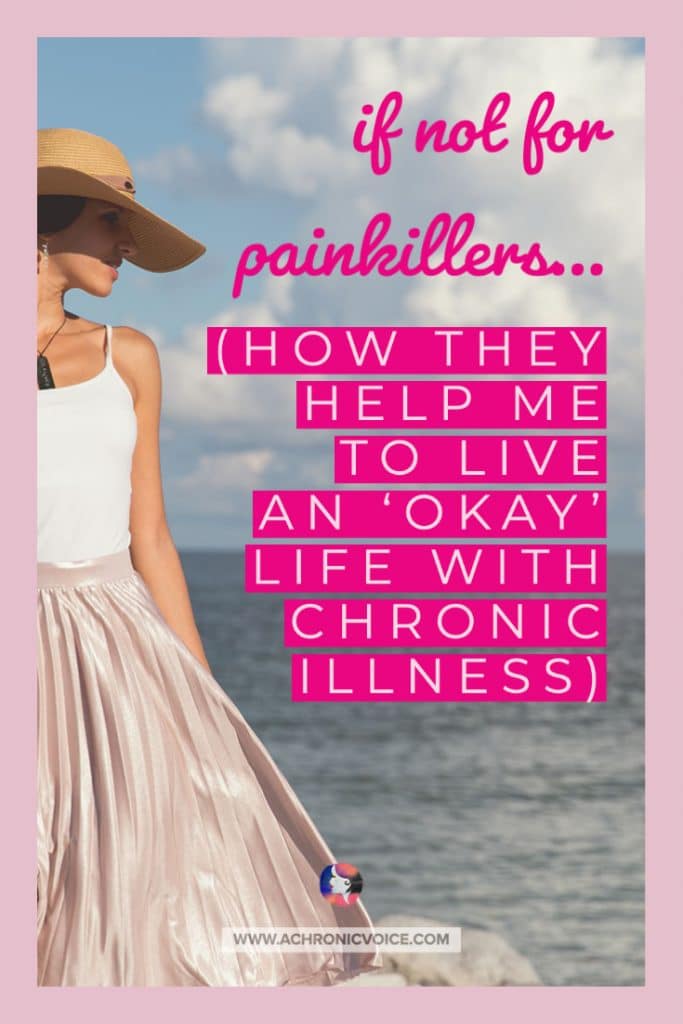
*Note: This article is meant for educational purposes and is based on the author’s personal experiences. It is not to be substituted for medical advice. Please consult your own doctor before changing or adding any new treatment protocols.
If you liked this article, sign up for our mailing list so you don’t miss out on our latest posts! You will also receive an e-book full of uplifting messages, quotes and illustrations, as a token of appreciation!
Pin to Your Healthcare & Chronic Illness Boards:
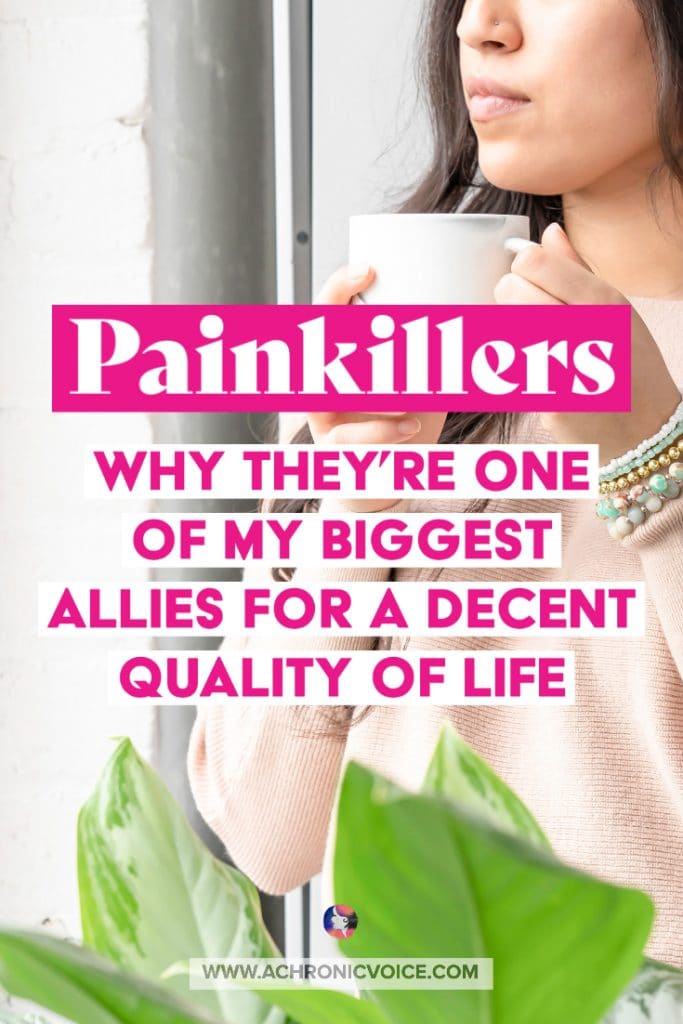
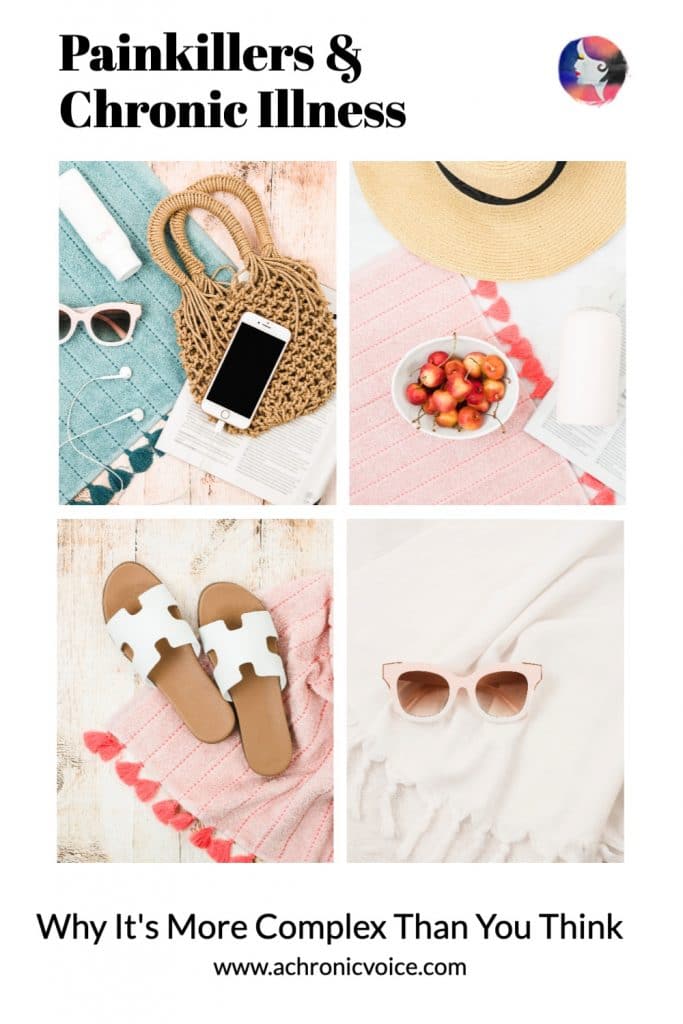
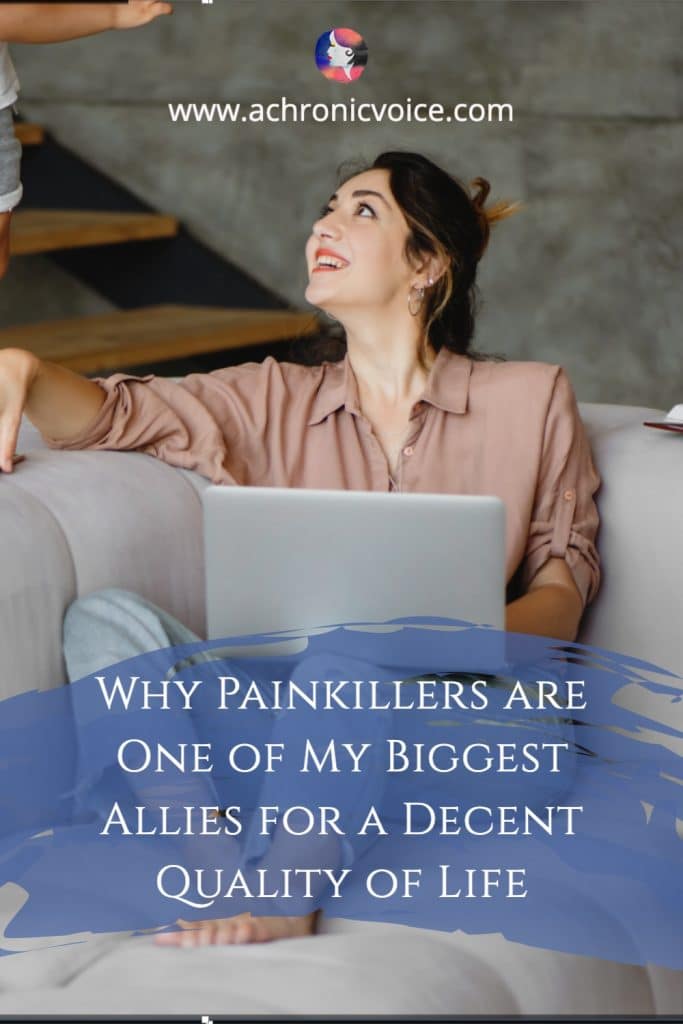
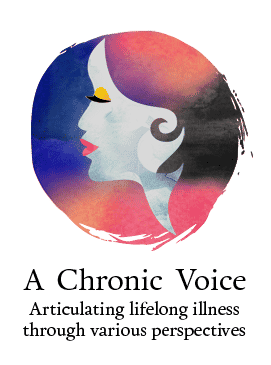
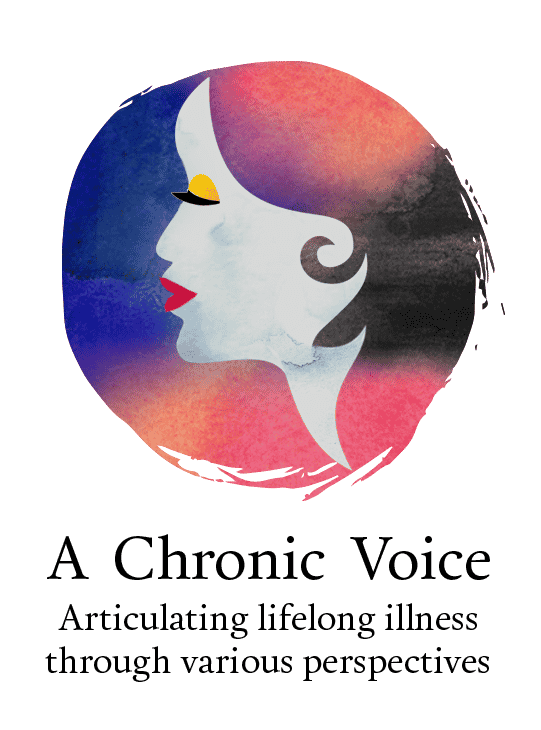
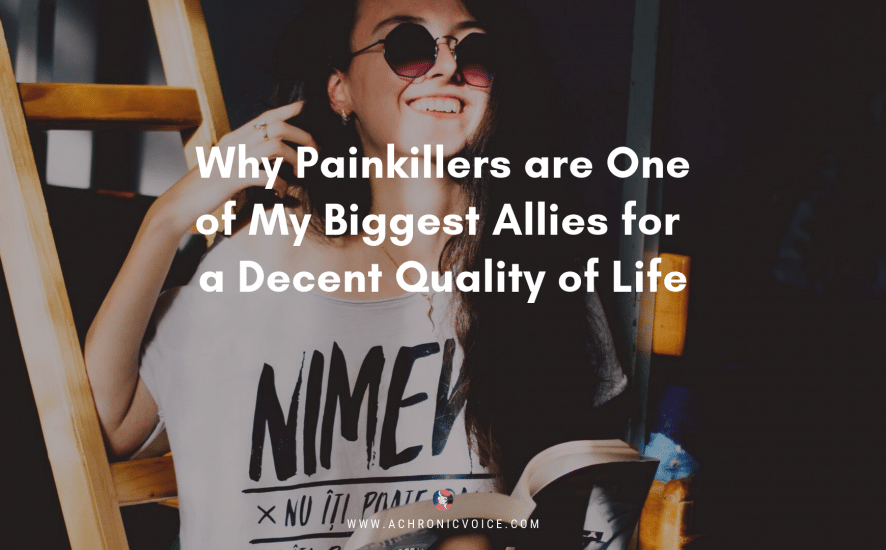
I really enjoy your website but especially this article. So many people judge and look down upon people who need pain medicine and even doctors are hard to get to understand what medications work and don’t work. It’s nice to see an honest person explaining how they feel. I have primary Sjögren’s,fibromyalgia and 10 other diagnoses and completely understand. Thank you for this.
Thank you Adrian for sharing openly, too. Our voices do need to be heard loud and clear. Yes so many people say they’ll never take meds for anything and tough it out. But after 20 years I think to myself, to what end? This is not living, either.
Such an excellent post, Sheryl. I take anti-inflammatory meds and anticonvulsant meds daily for some of my pain. They allow me to ‘manage’ most days. Then along come those days when something more is needed, like migraine meds. And then there’s the tramadol. I am always reluctant to take it because of side effects, however, there are days when I have no other option. I need to take it and put up with the side effects.
Pain can be uncontrollable and people need as much help as they can. There is a stigma attached to pain meds which should not be there. None of us take them through choice. We simply have to do what we can in order to cope. I know I couldn’t cope if all of my meds were taken from me. That doesn’t make me an addict. Just someone who lives with pain and needs help.
If not for my painkillers, I’d never leave my bed. I’m so tired of talking to people about this who don’t understand. I’m tired of people writing horrible, WRONG, information about painkillers without thinking about the millions of people who rely on them to function. I’ve never boosted my meds. I’m scared to ask for me. I make do with what I have. And now I’m at the point where if someone makes a snarky remark about what I’m taking for pain – GOODBYE. 🙂 I’ve got plenty of people in my life that do get it! Great post, Sheryl.
For sure, Carrie. I used to hold the same stigma myself, for a long time in fact. Because I was brought up to believe it was harmful and damaging to my kidneys and liver, and that I’d become an addict. But that is so so wrong. I am not addicted to my painkillers at all. Dependence and addiction are two worlds apart. And like you, without my painkillers, my quality of life wouldn’t be even decent. They allow me to gain some semblance of normality, however slight.
Great post. Too many people demonize pain killers and claim they don’t work (when anyone in pain can tell you that they do). With the opioid hysteria I lost access to treatment for pain completely, and I am way less functional then I used to be.
I am so sorry you lost access to such an important tool in your pain management toolkit 🙁 I know for sure it’s one of my biggest allies just to survive. I took one today for the aches, and I already feel so much better and can function and do some stuff. The stigma that it’s bad for you really needs to die. Living a half-assed life is also no good for anyone.
Well said! I get tired of being accused of drug seeking, when all I want is a chance a living a some what normal life for a brief amount of time. I say just walk a day in my shoes, and then tell me I should not take pain meds
Lynette
Agreed as well. Chronic pain is a whole new beast altogether.
“All these great benefits, just because I decided to take one pain pill instead of wrestling with pain, and wasting my day away. ” – it took me a while to be more accepting of pain killers and respect that my day is valuable and I can’t let it go waste.
Sometimes I feel I learnt this lesson too late but I liked reading your take on it and it helped reaffirm my decision to take pain killers.
Hi Shruti, I learned this lesson too late myself. I think especially in Asia, our parents tend to demonise painkillers as ‘addictive’ and ‘toxic for your liver’. They worry about us getting hooked on them. So I lived only on panadol at the most painful period in my life. Now looking back, I shake my head and think ‘how silly’. Seriously, when pain management is well controlled, it can work wonders and bring about a much better quality of life, especially for those who live with chronic pain.
I totally understand how you feel, I know without pain meds I would not be able to get out of bed. Unfortunately in today’s world, pain clinics think everyone is just out for th prescription, one day I finally told the doctor that I need them to survive and with MS it’s like having a toothache but in your whole body, his response ‘ gives me something to think about” I guess he has had a toothache before because now he just writes the prescription!
LOL! Funny how you had to relate it to him like that. Toothaches are awful. I’m glad he finally gave you the prescription! It really is quite terrible in the US as it stands right now 🙁
I’ve found that half my doctors want to increase my painkillers and the other half want me to come off them! I think I have got to know which pain needs them and when to take and when not too. I try and o other options first, but sometimes painkillers are what is needed and we shouldn’t feel guilty for that.
I’m really glad I have a goto rheumatologist whom I can request any meds from (within limits and that makes sense), as he’s my central doctor whom the others refer to. Yes doctors have their personal opinions on painkillers (and antibiotics!) too, but now I try and decide for myself when and how much I need. No one else inhabits my body or knows my limits, after all!
I have been suffering with chronic pain for more than 20 years now .
I honestly think without heavy duty pain meds, my latest version is the Fentanyl patch , that I wouldn’t still be around , to spend hours of agonizing pain .
It’s also important for your family members to believe there is something that can help you ., for them watching you go through your worst is an extremely hard and torturous .
For all these years I would put narcotics at the top of my pain control tools and distraction is a clear second .
Thanks Amelia for your post and regards to everyone with this life changing affliction.
Neil”…………
Hi Neil, thanks for sharing and adding another voice to raise awareness about chronic illness, pain and quality of life. Pain really eats away at so many facets of life, and whatever helps to maintain a semblance can go a long way.
Many people are choosing alternative therapies because pain killers are bad for health. But if this is the only solution, not much of a choice.
This was such an interesting post especially I have had limited experience with this area. You explain it very well. I have pinned this post on my group board.
Thanks so very much for the support Debbie, I appreciate a lot! 🙂
I can not even imagine what it is like to live with chronic pain, knowing that it’ll be with you always must make this even more difficult to deal with.
I had severe neuralgia for 18 months, the pain was so extreme, I have never experienced anything like it. Id pass out when the pain hit. I was not believed either and was regularly overdosing on over the counter medication.
It go to the point where I could see no way out and in an overdosed half conscious state, I almost made it as far as the nearest railway bridge.
Thankfully it is now a distant but very painful memory.
Thank you for sharing your experiences x
Hi Claire, thanks for taking the time to read, and share about your own experiences. Neuralgia I hear can be hell, and I can’t imagine that either. Unending pain really drives a person up the wall. I am glad you made it through, and hope you never have to suffer it again! x
My pain is worse than it has ever been and I am thankful for my slow release tramadol which I take twice a day so that I can walk and function a little. Frankly, without it, it is unbearable and I can’t sleep or get about very well at all. Or exercise… which is very important to the pain clinic that I do but physically impossible without pain management. I do not care about the stigma. It is my Life we are talking about here and I Need Quality of Life. Something others simply take for granted.
Exactly and well said, Nikki! Only live once, and the irony is that society is all about maximising your life, but how do you do that when you’re in pain all the goddamn time? I am thankful you have something to help you get by, albeit slowly I’m sure. Sending hugs x
Great read! I have suffered with chronic pain for years. I tried everything under the sun to get relief with no success. I refused narcotic pain meds for far too long fearing the risk of addiction, and the stigma behind them. The pain became severe a couple years ago and I could no longer function without pain meds. I take Hydromorph Contin (long acting) morning & night, and have regular release for break through pain. I am very careful to not take more than what is absolutely necessary. I think it’s so important to know that NO amount of medication will take 100% of the pain away, it only takes the edge off making the pain a bit more tolerable so I can have a bit more quality of life than if I didn’t take the pain meds. I have never felt “high” or “drugged up” from them so I don’t really understand why people get so addicted to them. If taken as prescribed they shouldn’t alter your state of mind, they should make you more clear because you are not in a state of unbearable pain with no relief. I still struggle with the stigma that comes with narcotic use, and it would be nice if chronic pain patients aren’t made to feel like the are “drug seeking”. There is enough of an emotional strain having an illness that leaves you in constant pain- the last thing we need is to feel weak & guilty for doing what is best for us…
Thanks for sharing such vulnerable thoughts, Angie. Am sure many others can relate, too.
I have had pain meds but only in the ED near death that made me feel nice and high, so I get how people can get addicted to them. But they helped me through that pain, and that was that. I am not craving for more, etc. It is a tool to get through a painful, difficult period. As for chronic pain that’s a different matter with different strategies, for sure. Like you said, no amount of pain meds can totally ease all the pain, it just helps us to actually live a little.
I’ll definitely be sharing this one! It’s so true that it really takes a variety of approaches to help us function. To demonize pain medication is so hurtful to those who need it. Well said.
Thanks for the support Kathy! Yes, it isn’t solely painkillers for a quality life either, but definitely a huge part of for chronic pain patients. We’d know best, in partnership of an unbiased, knowledgeable doc/docs!
You’ve made some very important points here about taking pain medication. I am on Opioid painkillers along with several other medications to manage my chronic pain. Without them, my pain would be at an 8 or 9 on the pain scale all the time. With them, I can generally stay at a 4-5 instead which allows me to have some quality of life.
Like you, I believe we need to have a community in order to heal. Without my pain meds, I wouldn’t be able to function at all as a normal human being – no managing things around the house, no going out, no spending time with my husband…nothing. I don’t even worry about things like addiction anymore…I know I’m dependent on the medication to stay as functional as possible and that’s just fine with me.
I’m glad you’ve found the solutions that work best for you. It’s all about our health!!
Hi Pamela,
Thanks for sharing your own thoughts, and I agree with your view points. I think it’s one others can’t possibly understand unless in severe daily pain. Life really doesn’t seem worth much then. We only live once, so living it well is important (ironic because this is exactly what society preaches!). And painkillers do help us to live a little better, to feel a bit more functional and human.
Fabulous article and like I always say, “you do you” and whatever it takes to make life more bearable
Thanks Rachael! And definitely. We all need to do what works for us individually!
Great article and really puts things in perspective for people who think painkillers are the “enemy”. This really sums up how I feel. Thank you so much for posting this. Love it.
Thanks for your comment, Lisa. I think it’s also how lots of us pain patients feel. Painkillers are not the enemy. It’s how we use them. Sending love.
Agree with everyone that this is a great post. I’m so sick of the negative rhetoric against painkillers, and the people who don’t take medication that could improve their quality of life because they are so afraid of … addiction, negative stigma, etc. I would not be alive without my antidepressants. I would be curled in bed all day sobbing if not for my pain meds. We are “addicted” to air, too!
Your comment “There is No Cut-and-Dry Solution to Managing Pain” is so true. One med that helps you may not help me at all, even with the same condition! (Lyrica didn’t do a thing for my nerve pain; it just made me gain weight! Tramadol might give others bad mental states, while it helps my pain so much. It’s scary to be a science experiment, but the improved quality of life is worth it! Thanks for speaking out!!!
@dSavannahCreate from dSavannahRambles
Haha I like the air analogy :p And yes our bodies are all different so what works for each of us, meds or otherwise, differs too. Tramadol can and does make lots of patients super nauseous for example, and I can only take the bare minimum before I feel it too I think (never really tried to go beyond, so there!). Like I said, do what’s best to live! 🙂
I don’t like how there is such a toxic negative discussion about medication. Without mine, I would not be able to work 2-3 hours a day, go on walks or meet friends in the weekend. It definitely improves my life and wellbeing. I have tried so many painkillers till I found the right ones for me. It has been a long proces. Like you mentioned, I don’t think you should just take pills for the sake of it but talk about it with your doctor and take your time to notice what the meds are doing to your body. Are the side effects worth it? Are there any long term risks? What is the best time of the day to take them? Etc… Anyway, I love your article and I believe it’s a very important topic to talk about!
Thanks for your support as always, Kirsten! Yes lots of unnecessary negative associations, because of a few mistakes or people (who themselves, need help of a different sort too perhaps). At the end of the day, everyone’s just trying to kill some sort of pain in one way or another.
And yes, the right pill and how it interacts/affects your body is also very important to pay attention to! Sending love.
This is such a brilliant post, Sheryl. This needs to be said and I think everyone should read it, including (and perhaps especially) doctors. There’s so much focus on the ‘opioid crisis’ in the UK and the US right now and while it’s good to be aware of the potential risks and pitfalls, it has the potential to be incredibly dangerous to patients. I eventually gave in to the need for Tramadol last year. Things were getting worse and worse and I was getting to the point of being able to manage to do very little because of chronic pain. I’d stayed clear of regular prescription painkillers for so long but a few things happened that made me knew I had to call it a day and look after myself better, starting with readjusting my perspective on such pills. As you say, they can help in giving us some semblance of life and the ability to do things the basics and hopefully also the things that are important to us, like you caring for your birds. Also really good points about leaving pain untreated and the sensitivity factor, I hadn’t really thought about that before.
Absolutely fantastic post!
Caz xx
Hi Caz,
Thank you and exactly. It’s really a weigh up of pros and cons as always, and for chronic pain patients, the game of life is not like everyone else’s. Our cards in life are different, and to win or endure, we need to use different strategies, too. Thanks for your comment x
I recently watched an interview with Dr. Genevra Liptan where she talks about not taking opioids out of the pain management toolbox, but guidance for how to prescribe. She suggests weaving very small doses with other things to find out what can best work for each individual suffering from pain. http://www.drliptan.com/blog
Great and needed post. It is educational as we don’t know what people are going through. People without chronic pain need education on this as I think we have assumptions that are not correct.
Thanks Amelia! I think even lots of us with chronic pain started out with our own stigmas, too. Until you’re in real bad pain every day, people have no idea.